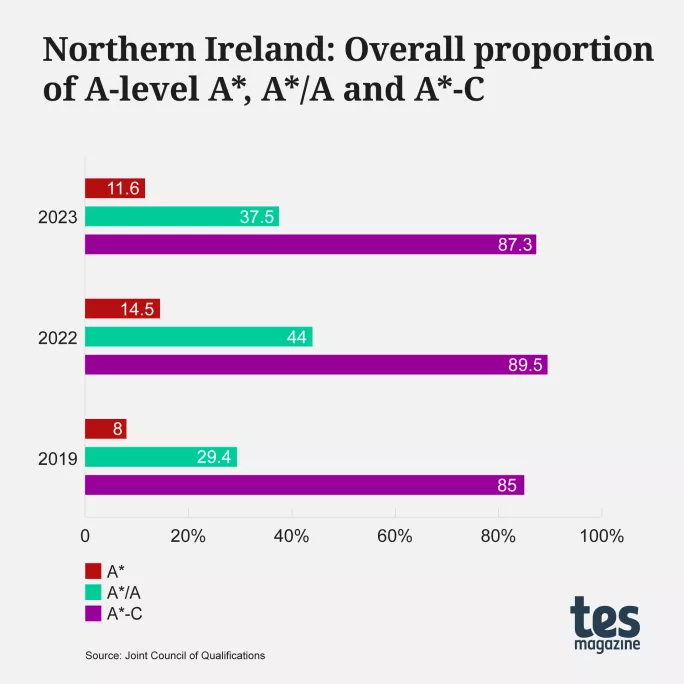A-level passes in Northern Ireland returning to pre-Covid levels

A-level attainment rates in Northern Ireland have fallen compared with 2022, although they remain higher than in 2019, the last year before the coronavirus pandemic.
Provisional data published today on behalf of the Joint Council for Qualifications (JCQ) shows that 37.5 per cent of students received an A or an A*, down from 44 per cent last year.
This year’s figure is still markedly higher than in 2019, when it was 29.4 per cent.
A-level results in Northern Ireland
Awarding bodies across the UK are trying to avoid comparisons with 2020 and 2021, when there were no national exams and grades were determined by teacher judgement. This led to significantly higher pass rates. In Northern Ireland in 2021, for example, 50.8 per cent of students received an A or an A*.
Meanwhile, 11.6 per cent received a A* this year (14.5 per cent in 2022 and 8 per cent in 2019). In 2021, when there were no national exams, the figure was 15.8 per cent.

More than 26,000 students in Northern Ireland have received their results. The number of A-level exam entries has increased by 1.3 per cent to 32,925 from 32,506 in 2022, in line with changes in the school-age population.
The JCQ has said: “Comparisons to any previous years’ results should be approached with caution due to the differing methods of assessments and circumstances.”
Returning towards pre-Covid norms
Exam bodies are continuing to move back towards pre-Covid awarding arrangements. When exams returned last year students had the option to omit a unit of assessment in most subjects, and this year they were provided with advance information on some topics in the majority of exams.
Examiners were also told to be mindful of disruption to learning caused by the pandemic when considering overall student performance.
Students who sat A levels this year did not sit GCSE exams, which were cancelled during the pandemic.
Today’s JCQ data shows that 87.3 per cent of students in Northern Ireland got a C or above, down from 89.5 per cent in 2022 but up from 85 per cent in 2019.
The A*-E pass rate in Northern Ireland this year is 98.8 per cent, down from 99.1 per cent in 2022 but up from 98.4 per cent in 2019.
AS-level entries increased from 35,328 in 2022 to 39,336 (by 11.3 per cent). In provisional AS outcomes, 33.5 per cent of students achieved grade A, with 97.5 per cent achieving an A-E grade.
- England: A-level results 2023 - key trends
- Wales: A-level pass rates fall but remain above pre-Covid levels
- Scotland: What happened on 2023 SQA results day?
Today’s data also shows that biology has replaced maths as the most popular A-level choice in Northern Ireland.
The top five A-level subjects overall are: biology (9.8 per cent of entries); maths (8.9); health and social care (8); business studies (6.8) and history (6.4).
For girls, the most popular A-level subjects are: health and social care (11.7 per cent); biology (10.7); maths (6.8); chemistry (6.2); and English literature (5.8).
For boys, the top five are: maths (12.1 per cent); business studies (9.1); biology (8.5); history (8); and geography (7.7).
Graham Gault, director of school leaders’ union NAHT Northern Ireland, said: “These grades are the result of a huge amount of hard work in challenging circumstances, by both students and school staff. Everyone should be very proud of their achievements.
“Although we are seeing different A-level results this year, this is not a reflection of the achievements of students but simply a result of continued moves back towards pre-pandemic grading models. The numbers are a reflection of the system and not the students. Universities, employers and other providers know this and should take this into account when making decisions on places and offers.”
Dr Gault added: “It is vital that everyone remembers that we cannot compare this year’s results with those from previous years. The student cohort, the context and the approach to grading has been different every year since 2019, so simplistic comparisons are unhelpful and will not tell the full story of the experiences of students or their schools and colleges.”
Gerry Campbell, chief executive of the Council for the Curriculum, Examinations and Assessment (CCEA), the most used of five awarding bodies that operate in Northern Ireland, said students should be “praised and admired for the resilience and hard work they have demonstrated throughout their studies”.
He added: “I would also like to thank and pay tribute to Northern Ireland’s school leaders, teachers and lecturers for the support, guidance and dedication that they provided for their students over the last year.
“In addition, I want to recognise the valuable and important work that examiners and moderators have carried out this year to enable students to get their results.”
Northern Ireland’s GCSE results will be published a week today, Thursday 24 August.
Careers advice for students who received their results today is available here, or by calling 0300 200 7820 from Monday to Friday between 9.30am and 4.30pm. Anyone with queries regarding CCEA’s results can call 028 9026 1260, or email helpline@ccea.org.uk
Register with Tes and you can read two free articles every month plus you'll have access to our range of award-winning newsletters.
Keep reading with our special offer!
You’ve reached your limit of free articles this month.
- Unlimited access to all Tes magazine content
- Save your favourite articles and gift them to your colleagues
- Exclusive subscriber-only stories
- Over 200,000 archived articles
- Unlimited access to all Tes magazine content
- Save your favourite articles and gift them to your colleagues
- Exclusive subscriber-only stories
- Over 200,000 archived articles
topics in this article



